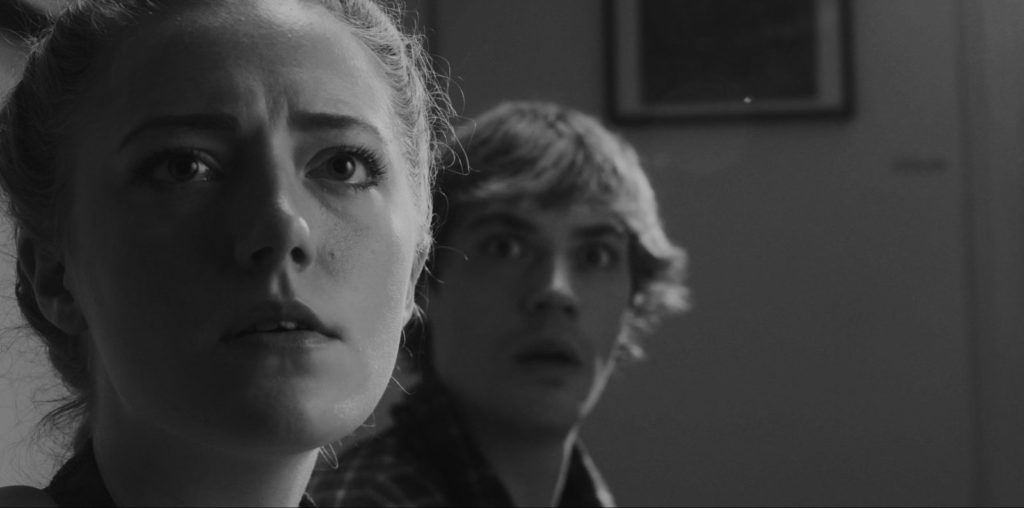
The 2012 Seattle International Film Festival, a magical, mind-expanding, eye-feeding carpet ride for those fond of falling deep into moving-picture hypnosis, continues into its third amazing week. But the sheer number of carpets and destination points requires an air traffic controller.
Or not.
Forget carpet licenses and registration. This is an untamed frontier, best enjoyed without red lights or roadblocks. Fly recklessly (after all, you have a dozen cinemas to navigate between), imbibe at the many SIFF party spots along the way (magic carpets have built-in designated drivers!), and chuck the GPS. Savor each unplanned stop along the way.
Detour through the noxious, nasty eye-poison of “Klown,” and you’ll either be howling in the aisles or puking up your popcorn. For a more secure route, enjoy the reliable crime-genre action of “Unit 7.” Bored by local landmarks? Behold, as Northwest imagery is re-imagined through a fresh lens. “Welcome to Doe Bay” is your ticket into an Orcas Island music festival, held a mere 80 miles from SIFF’s Seattle stronghold.
A few theaters away, “Dragon” and “The Woman Knight of Mirror Lake” promise visceral physical kicks and jabs. But a few non-martial arts films deliver more damaging gut-punches. Case in point: “Polisse,” Maiwenn’s ferocious French mind-kick. It will drain your brain, and drag you through an emotional ringer of the most dramatically resonant kind.
Meet the Child Protection Unit of Paris. Crusaders for the well-being of kids, its members are passionate about sweeping pedophiles and abusive parents off the streets. Mothers and fathers themselves, these dedicated men and women stand up for the under-aged. But by the time their demanding days are done, there’s nothing left for families waiting at home. Like agitated bees swarming outside their hive, these haggard heroes hover together for mutual support. Anything to divert the waves of perpetual burn-out resulting from one disturbing interrogation too many.
“Polisse” isn’t concerned with plot. Instead, it examines group dynamics, and the delicate psychological tightrope that CPU cops must navigate. By necessity, each wears many faces. They’re steely, unflinching, and direct while questioning child molesters, but also empathic to the frightened child unwilling to confirm a grandfather’s lecherous behavior. They vent to office comrades about unspeakable scenarios that outsiders can’t possibly comprehend.
Meanwhile, director Maiwenn pulls off that rare dramatic miracle: nearly every character in “Polisse” is infused with a complicated, wonderful, fully-developed spirit. Two female work partners demonstrate a toxic yin yang, volleying their contrasting views on men with furious racquet-swings. An Alpha Male struggles with his own tortured duality, compressed passion and anger exploding into fisticuffs. A unit chief becomes disgusted with his own need to compromise politics with the hard-earned integrity of his front-line grunts.
Messy. Contradictory. Life. In an artful, brilliant crescendo, the team’s tensions and pressures finally burst, fragments of both despair and victory allowed release. “Polisse” is a mind-blowing, heart-wrenching movie. Prepare to feel emotions you never thought existed.
“Klown,” an intentionally revolting, Danish variation on “Sideways,” follows two heinous cretins on a wick-dipping odyssey of the most depraved variety. Geeky Frank (Frank Hvam), boasting the atrophying physique of Don Knotts, anticipates some debauched guy-time with buddy Casper (Casper Christensen). Perpetually h***y, the hedonistic Casper has invited Frank on a Joseph Conrad-style canoe-trip, which he dubs “Tour de P***y.” Casper promises that this ride through the ripples will propel them towards a lusty land of shoreline brothels and reefer parties.
Frank, however, is struggling to mend his marriage. Wife Mia (Mia Luhne)aches to have children, and rightly suggests that Frank is not suitable “father material.” He openly despises kids and finds the idea deplorable. However, when Frank’s brother-in-law is incapacitated, the self-proclaimed tyke-hater is asked to look after his relative’s pre-teen son. Frank’s nephew, Bo (Marcus Jess Petersen), is an obese tow-head with major self-esteem issues. Reluctantly, Frank must become Bo’s guardian.
This puts a serious fly in the ointment of Casper’s upcoming “paddling-for-poon” adventure. Casper openly pronounces that tail-chasing trumps parenting, pleading with Frank to dump Bo with another sitter, and commence with their carnal canoeing crusade. Frank, however, sees Bo as his opportunity to show Mia (Mia Lyhne) that he can, in fact, demonstrate paternal excellence. In an ill-conceived effort to have his cake and eat it too, Frank takes Bo along for the trip.
Predictably, this decision is a recipe for disaster. Despite the presence of a minor in their mix, Casper is undaunted in his quest to get laid. A kindly female lodge-keeper offers Casper both pancakes and pleasure, a camp of underage high-school girls prompts an ill-fated effort at snagging jailbait, and a riotous pot-party results in id-propelled reefer madness.
Unsurprisingly, it isn’t long before the hedonistic duo lose track of Bo. The sobering reality of this predicament causes Frank to take on a small smidgeon of responsibility. It’s a start… but is this blooming maturity too little too late?
In its gleeful mission to churn forth the most jaw-dropping, “no-way-that-just-happened” humor, “Klown” certainly has its ghastly, guffaw-inducing moments, including a lesson in how NOT to give a pearl necklace. Unfortunately, the film isn’t as funny as it thinks it is. Men running around in underwear. Capsizing canoes. Frantic, bug-eyed bickering. Not funny. The jazzed-up “Midnight Adrenaline” crowd was psyched and rabid for a night of irreverent, riotous hoots ‘n howls. Throughout the screening, however, much of the laughing seemed forced, or altogether absent.
SIFF is a hotbed for solid crime-genre films. This year, “Countdown” and “Unit 7” represented two extremes on the cop continuum. The former involves Tae Gun-ho (Jeong Jae-young), a stone-faced debt collector in desperate need of a liver donor. He’s deathly sick, nodding off at random and turning a jaundiced yellow. Tae’s organ-hunting odyssey leads to a con woman (Jeon Do-youn) whose liver matches his own. Why? Because years earlier, the scheming femme fatale received a liver transplant of her own. The donor? Our hero’s deceased son.
Intriguing questions abound. What prompted the death of his young boy? Why is the conniving anti-hero being hunted by so many gangsters and white-collar criminals? Will she agree to the procedure? If so, will our determined debt collector keep his conniving donor alive in time for the transplant? “Countdown” also boasts an ultra-glossy, stylized sheen that’s easy on the eyes.
So far, so good. Unfortunately, Huh Jung-ho’s film is severely compromised by lax editing. Flashback scenes go on ad nauseum, answering questions we’ve already resolved. Suspense is neutered, while melodrama is ratcheted up to a sappy fever pitch. Hopefully, its producers will get the hint from restless audiences, and extract these prolonged passages before “Countdown” achieves wider release. It’s ironic that a film about organ transplants could benefit from so many surgical extractions of its own.
“Unit 7,” however, delivers the goods in a more tightly-wound fashion. It’s nothing that hasn’t been done before, but the execution is solid and believable. We’re whisked into the construction-heavy streets of Seville, Spain. In preparation for the 1992 International Expo, law enforcement honchos hire four Spanish cops to clean up the city of criminal scum.
Meet Angel (Mario Casas), a hot-headed, hotshot detective and newly-inducted member of a cop clique known as Squad 7. He’s young, handsome, and seemingly upstanding. However, Angel soon unveils his dark side. Exercising a dubious form of quid pro quo to nab upper-rung drug-runners, Angel steals dope from drug busts. As the situation requires, he then provides it to strung-out informants in return for leads. He’s also fond of kicking ribs and beating faces as the occasion calls for it.
Within a year, Squad 7 is responsible for over half the city’s police arrests. But there’s a flipside. They’re also receiving “ten times the complaints,” primarily on account of Angel’s brutal, illegal tactics. There’s something rotten in Seville, and Internal Affairs knows it. Meanwhile, the area’s criminal underground is nursing a growing grudge against Angel’s unit.
How does all of this pan out? “Unit 7” delivers a satisfyingly suspenseful denouement. It also creates a convincing crew of flawed, sympathetic lawmen, with great acting across the board. Even so, this is awfully familiar stuff. As another viewer mumbled while exiting the theater, “See one crime movie, and you’ve seen ‘em all.”
It’s supremely ironic that a film about hallucinogenic substances was, in fact, the most objective, straight-faced doc I’ve seen so far at SIFF. “The Substance: Albert Hoffman’s LSD,” will act as a filmic flashback amongst those who lived through the Flower Power era that defined this drug. But even if you didn’t obey Timothy Leary’s mantra, “Turn on, tune in, and drop out,” you’ll enjoy Martin Witz’s film as a mind-stimulating – rather than mind-altering – history lesson.
“The Substance” offers an enlightening, clear-eyed education on a trippy subject … but don’t assume that it’s a drab, clinical science class. Witz’s film opens with a mesmerizing gel of images: the Golden Gate Bridge, water droplets, windswept grass, and strobe lights, all suggesting the sweep and influence of LSD on science, society… and human emotion.
We’re introduced to elderly Swiss chemist Albert Hoffman, who discovered LSD in 1943 and eventually embarked on the world’s first acid trip. Through wrinkled, century-old eyes (99 years old at the time of filming, Hoffman lived to be 102), this talkative Father of LSD conveys the overwhelming pull of that first psychedelic experience. “All my thoughts turned into pictures,” he recalls, staring at the skies.
In a refreshingly non-judgmental tone, Witz convinces us that depending on the era and those who shaped it, LSD took on many roles. In the 1950’s it played a crucial part in psychiatry, as doctors explored its potential for neutralizing schizophrenia. One of the film’s many talking heads also describes the U.S. Army’s interest in the drug as a “psychochemical weapon,” to be dumped onto unsuspecting enemy soldiers. During the Cold War, the film reports that LSD was studied as a potential truth serum, to be used by the CIA during interrogations.
By 1967, with the hippie-dominated Summer of Love in full psychedelic bloom, LSD took on its most popular and infamous persona – as an out-of-control recreational hallucinogenic. As Timothy Leary championed LSD’s widespread usage with reckless abandon, conservative forces stepped in to criminalize the beloved chemical compound (derived from ergot, a grain fungus that typically grows on rye). It is implied that even Hoffman eschewed Leary’s radical promotion, and felt it was irresponsible.
After years of being denounced and abandoned, “The Substance” suggests that LSD is making a comeback, reducing the pain and depression of cancer sufferers. A John Hopkins University research project is currently conducting trials, dispensing LSD to patients in a controlled environment. Based on filmed testimonials, it would seem as though this strategy has merit. One trial participant uses a sailboat analogy to describe LSD’s peaceful, depression-lifting effects: “It’s like you fall off the boat, then the boat’s gone, the ocean’s gone, and you’re gone.”
Bursting at the seams with beakers, test tubes, hippies, a magic bus, Merry Pranksters, and a teary, tripping artist who shakes his head while describing “lovely, vibrating colors,” “The Substance” is an amazing journey. Four stars? I’d give this a “Four Tabs of Acid” rating instead.

